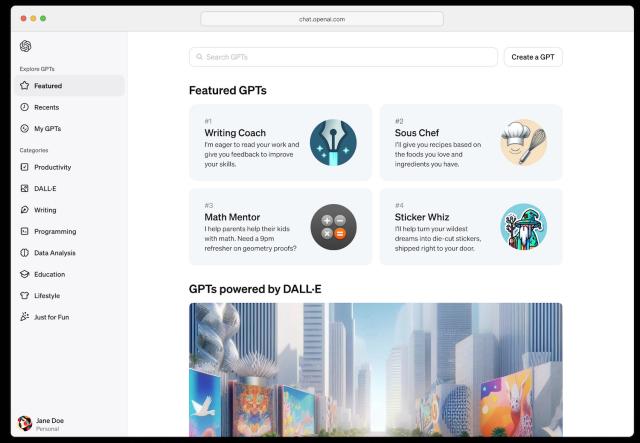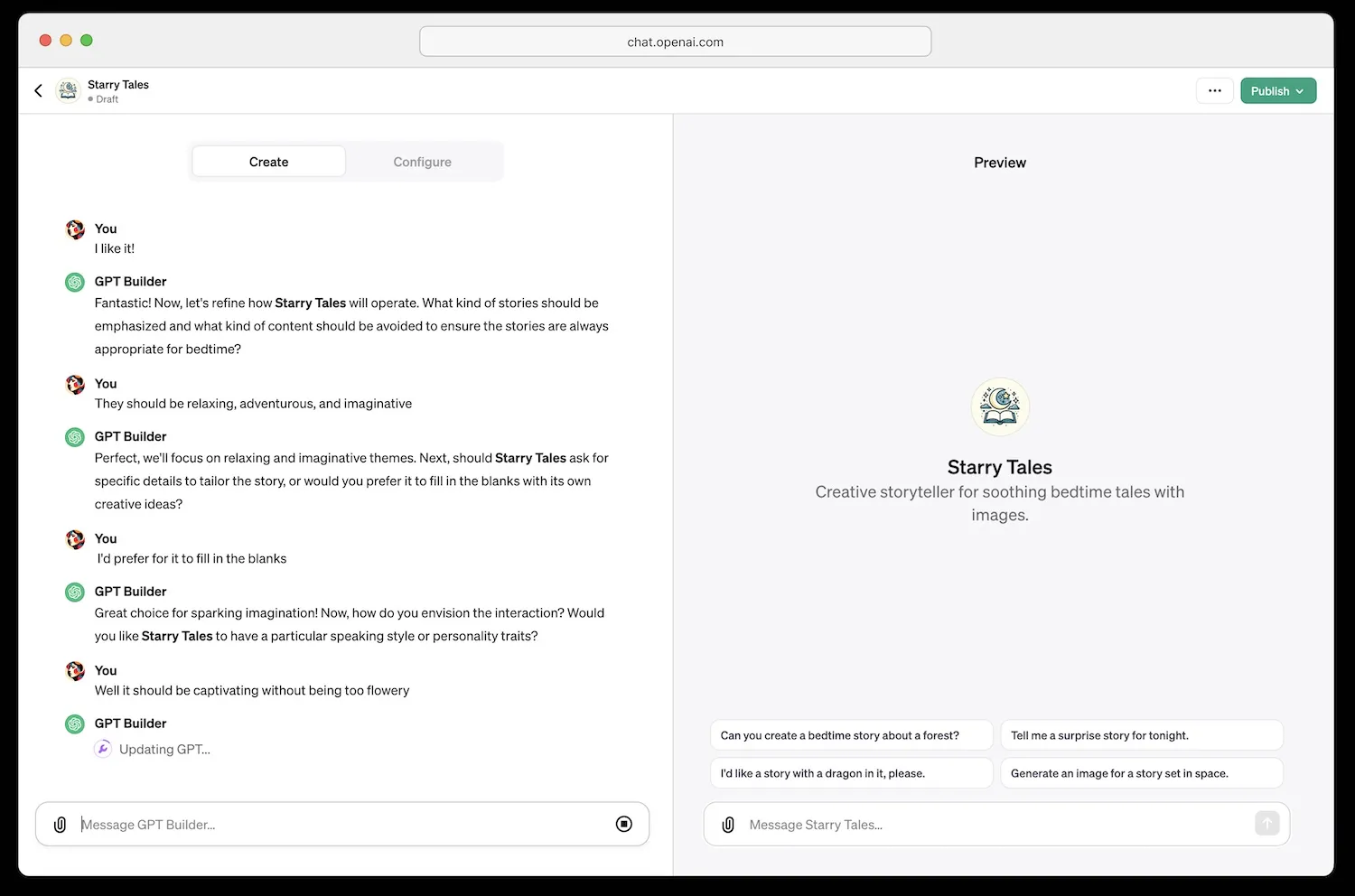GPTs and the GPT Store by OpenAI | GPTsHunter
Posted on November 5, 2023

Introduction
ChatGPT took the world by storm when it launched in November 2022, showcasing the impressive power of large language models to hold natural conversations. Now OpenAI is taking things even further with GPTs - customized versions of ChatGPT that are tailored for specific purposes.
GPTs allow anyone to create a version of ChatGPT optimized for helping with a particular task, subject matter, or use case. For example, you could make a GPT that's an expert in cooking, a tutor for math homework, or even an AI dungeon master for tabletop RPGs! The key benefit of GPTs is that they provide more specialized assistance than regular ChatGPT which has broad general knowledge.
To share these helpful creations, OpenAI will soon launch the GPT Store where users can publish their own GPTs and browse ones made by others. The store will highlight popular GPTs and even allow creators to earn money as adoption of their GPT grows. This guide will walk through how to create your own GPTs, customize them for different uses, share them via the GPT Store, and best practices for GPT builders. Let's get started!
How to Create Your Own GPT
Creating a tailored GPT assistant is easy and doesn't require any coding knowledge. Here are the steps:
Open the ChatGPT interface and look for the "Create a GPT" option. This will launch the GPT builder.
Give your GPT a name and description so users know what it's for. Be clear on its purpose.
Start a conversation with the AI assistant to define the GPT's knowledge, skills, and how it should behave. Explain what you want it to be an expert in.
Specify any additional capabilities like searching the web, analyzing data, or generating images/text. The builder will guide you in enabling APIs.
Choose privacy settings like whether your GPT's conversations can be used to train OpenAI's models.
Publish your GPT either for personal use or submit it for inclusion in the GPT Store!

Customizing Your GPT's Knowledge and Skills
The key to an effective GPT is taking the time to thoroughly customize it for a specific purpose. Here are some tips:
Give clear instructions on how you want it to communicate and respond in conversations. Provide examples.
Supply domain-specific knowledge through documents, datasets, or information manually entered in via the builder.
Define any special capabilities like analyzing data, interfacing with third-party APIs, generating text/images, etc.
Pick a persona or communication style matching its purpose, like friendly tutor or casual gaming buddy.
Allow web access so it can search and incorporate latest real-world information.
Test it extensively with sample conversations and further refine its instructions and knowledge sources.
Using GPTs for Different Purposes
Once you've built your GPT, the possibilities for using it are endless. Some examples of helpful GPTs for different purposes include:
Productivity: Schedule your calendar, aid with email, research/writing assistant
Education: Tutors for academic subjects, homework/studying aide
Gaming: RPG companion, strategy game advisor
Health/wellness: Diet/fitness planner, mental health chatbot
Domain expertise: SQL programming consultant, legal research specialist
Everyday help: Travel planner, cooking assistant, shopping advisor
The key is to carefully design your GPT's knowledge and capabilities around its intended purpose. Think through sample use cases and how to optimize its instructions and knowledge sources accordingly.
Sharing Your GPT on the GPT Store
Once you've built a great GPT, you can publish it publicly on the upcoming GPT Store so anyone can access and use your creation:
Submit your GPT for review to ensure it aligns with OpenAI's content policy
Choose whether you want it visible publicly, unlisted, or private
Add keywords, categories, and descriptions to optimize discovery
Monitor user feedback and ratings to improve your GPT over time
Once launched, you may be able to earn money as your GPT gains active users
Promote your GPT on social media highlighting the benefits and use cases
The GPT Store will enable the community to share, find, and benefit from each others' creations.
Best Practices For GPT Builders
Here are some top tips to follow when creating effective and helpful GPTs:
Test extensively with sample conversations to identify gaps. Iteratively improve based on results.
Carefully check responses comply with OpenAI's content policy before publishing.
Pick a very clear purpose and optimize instructions, knowledge sources, and integrations accordingly.
Provide sufficient domain-specific data/documents to make it an expert in that specialty.
Have a predefined strategy for handling incorrect responses to user questions.
Use feedback from early users to identify areas needing improvement.
Regularly update it with new information, capabilities, and instructions as it evolves.
Promote your GPT in its descriptions by highlighting the exact user benefits and use cases it can help with.
Following best practices will ensure your GPT provides a great user experience.
The Future of GPTs
GPTs represent just the beginning of how customizable AI assistants can become specialized tools integrated into our daily lives:
GPTs will rapidly advance to become smarter and more capable as the technology improves.
They may take on real world tasks by interfacing with APIs, websites, and platforms.
OpenAI will refine model capabilities and safety based on user feedback from GPT usage.
Financial incentives will motivate builders to create helpful GPTs as they can earn based on adoption.
Enterprises can tailor internal GPTs optimized for their business needs and proprietary data.
Developers will build third-party services and apps powered by GPTs behind the scenes.
Careful consideration around ethics and societal adaptation will be important as GPTs become more advanced.
GPTs are an exciting step towards more configurable AI assistants that provide users specialized help on demand.
Conclusion
GPTs unlock the ability for anyone to build customized AI tools tailored for specific use cases without needing to code. The GPT Store will allow easy sharing of helpful creations within the community.
With simple conversational instruction, you can shape every aspect of your own GPT - what it knows, how it behaves, and what it can do. The possibilities are endless. You can publish your GPT publicly or keep it private.
As GPTs advance, they open up new ways for more people to actively participate in guiding AI development through practical examples of useful applications. GPTs are just the beginning of increasingly configurable AI assistants. We encourage you to start creating and sharing your own specialized GPTs today!